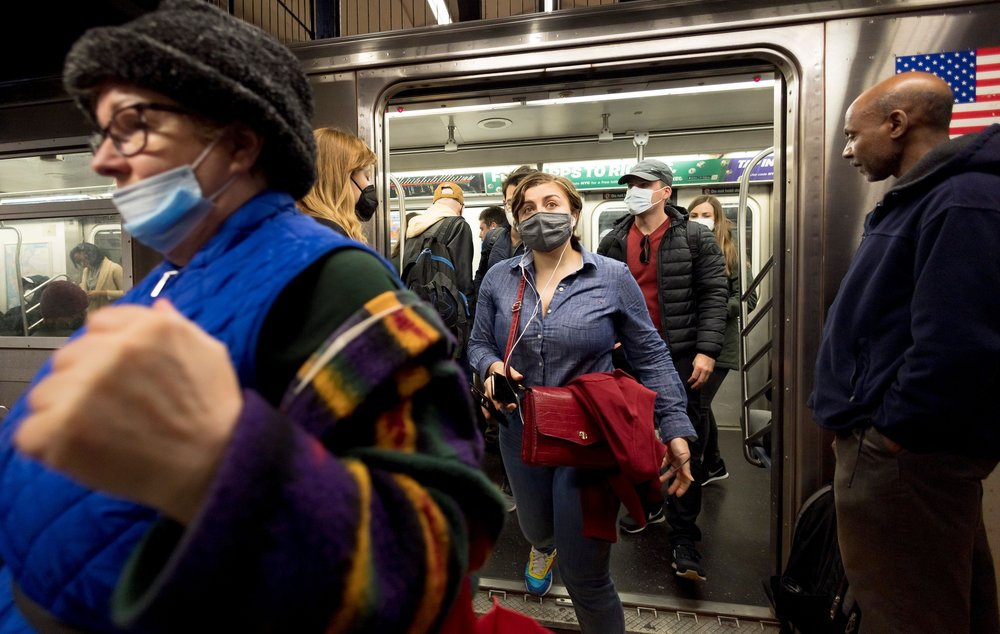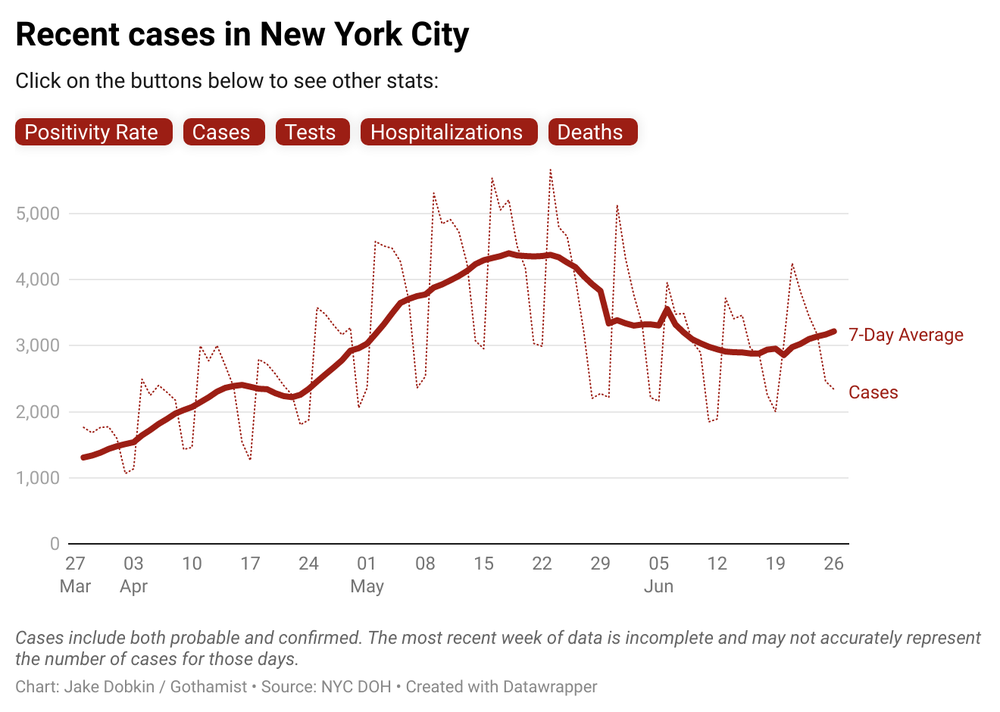As NYC enters coronavirus plateau, health officials push for extension of long COVID services
June 30, 2022, 6:01 a.m.
City doctors say that long COVID can be confusing and sometimes scary — but also that people don’t need to suffer in silence.

Walk down the streets of New York City, and it might feel like most people have moved on from the pandemic. But COVID-19 isn’t finished with us.
Even though the most recent surge has peaked, cases remain high. The virus is still infecting 3,000 city residents per day — a level that hasn’t really budged for two weeks. This plateau is mirrored in the numbers of New Yorkers who’ve been currently hospitalized with virus — the daily tally has hovered between 700 or 800 since mid-May.
All of those cases are quietly raising the number of people dealing with long COVID — or symptoms that linger well after an infection has cleared. Studies are showing some connection between the initial severity of a person’s coronavirus infection and their chances of developing long COVID.
The vaccines appear to offer some protection, given they thwart severe disease but lingering symptoms can materialize even in people with immunity. A large, preliminary study involving 5.4 million people seen by the Department of Veterans Affairs shows reinfection still carries a significant risk of hospitalization, especially among people who aren’t fully vaccinated.

City doctors say that long COVID can be confusing — and sometimes scary — but also that people don’t need to suffer in silence. New York City Health + Hospitals, for example, has established an AfterCare program for anyone in need.
WNYC host Michael Hill spoke with Dr. Ted Long about what the program, which has served hundreds of thousand already, can do for people. Long is the senior vice president for ambulatory care and population health at NYC Health + Hospitals and executive director of the NYC Test & Trace Corps.
He is meeting with colleagues this week to discuss a substantial continuation of the AfterCare program to expand its outreach. Their conversation below was edited for clarity.
Hill: Long COVID is really a broad spectrum of symptoms and conditions. Some are fairly routine, while others are way more serious and need specialty medicine.
What are the most common symptoms you're seeing that can be easily treated?
Long: Across the country, we now know that, unfortunately, 10 to 15% of people that have COVID will go on to develop long COVID or have one of the symptoms that you're talking about — ones that will either linger past four weeks after having their infection or a new symptom that they'll develop four weeks after having their infection.
Michael, I'm a primary care doctor in the Bronx, and I'm continuing to see more of my patients that I care about developing long COVID now. My patients have some of the more common symptoms, like shortness of breath, fatigue and even depression
But really what worries me is the people in New York City that are not my patients — that are suffering in silence, confused about what's going on with them. They’re not sure if it's long COVID or something else.
In New York City, we have an answer. We have a number for you to call or we're going to be calling you. We want New York City to be a place where nobody suffers in silence.
Now your AfterCare program addresses long COVID through three core functions. The first is its AfterCare navigators.
Who are they? And what exactly do they do?
Our AfterCare navigators are the same people that were calling you when you had COVID as part of the city’s Test and Trace initiative — through our Take Care program.
They were the people helping you access one of our free hotels; to get free food delivery; even to give you direct cash assistance so that you don't have to make the false choice of going to work if you're infectious or staying home and not having the income to support your family,
That's a choice no New Yorker or no person should ever have to make. And we received a large grant to be able to pay you to do the right thing for yourself, your family and your city.
So these AfterCare navigators are the same people that helped you with all of those things before. They're now, now going to help you navigate whatever it is you need to get through having long COVID.
Health and hospitals has also set up health hubs called COVID-19 Centers of Excellence.
Where are they? And what kind of services do they provide?
Our centers of excellence are new brand new clinical sites that are really focused on having everything that we need to take care of you with the most common conditions or symptoms associated with long COVID.
So if you're having shortness of breath, we'll do a pulmonary function test and have our onsite pulmonologist see you. If you're having heart issues, we can do an echocardiogram with an onsite cardiologist as well. And we can give you same-day services for depression and anxiety.
We really built up the centers to help New York City to recover, recognizing early on that long COVID is serious and real.
So if you wanna make an appointment to one of our centers, you can call 1-844-NYC-4NYC (1-844-692-4692). Or if you wanna talk to one of our navigators and also make an appointment, you can call 212-COVID19 (212-268-4319); press four; and you'll be put directly through to a navigator.
Dr. Long, the next step in the AfterCare program involves community support and help groups tell us about that.
That sounds almost a little odd, based on some of the things that we have been hearing about COVID over the last two-plus years, namely the need to social distance and kind of stay away from people.
Well, you pointed out why it's so important. Over the last two years, we've taught ourselves to stay away from other people. But human beings have the natural desire to build community, to build relationships with other people. That's how we get through traumatic events.
For many people, including many of my patients, what they need most may not be a doctor in front of them. It may be having a group of people that also has long COVID.
They can talk about what they're experiencing so they can get through together, building that community. That's what we wanna make sure is available to every New Yorker through that second pillar.
The third part of the city's AfterCare program is financial support. It sounds like this financial support is a continuation of what you already have been offering.
We learned early on that COVID can cause a lot of financial stress and instability for families. So of course, we're building that into how we're looking to take care of people with long COVID.
Dr. Long. I heard you mention some numbers. The Centers for Disease Control and Prevention says about 13% of COVID cases go on to develop chronic symptoms for at least a month, but some global studies put the long COVID rate, upwards of 40%.
Given those numbers, do you feel like the AfterCare program is being underused?
So I'm proud to say that our AfterCare program has already texted more than 300,000 new Yorkers that we knew had symptoms at the end of their monitoring period. The same goes if they were part of our Test and trace core program. We've already received 50,000 phone calls from New Yorkers that we were able to put through to our navigators.
We were also able to help more than 100,000 complete their referrals to get them whatever it is they need -- whether that's seeing me in one of my centers of excellence, whether that's being supported by a community group like the body politic or whether that's having help to prevent eviction from their home or to support their family.
So far, the AfterCare program has done a phenomenal job of helping New Yorkers by saying long COVID is real, but whatever you're experiencing, we can help you.
We're going to be expanding the AfterCare program so that every new Yorker with long COVID always has a safe place to call.
Editor’s note: Here’s a list of the COVID-19 Centers of Excellence for anyone in need:
NYC Health + Hospitals/Gotham Health, Tremont Community Health Center
1920 Webster Ave., Bronx, New York 10457
Brochures: English | Español
Hours of operation
Monday, Wednesday, Thursday: 8:30 AM – 7:00 PM
Tuesday, Friday: 8:30 AM – 5:00 PM
Saturday: 8:30 AM – 4:30 PM
NYC Health + Hospitals/Gotham Health, Roosevelt
37-50 72nd St., Jackson Heights, NY
Brochures: English | Español | বাংলা
Hours of operation
Monday, Wednesday, Thursday: 8:30 AM – 7:00 PM
Tuesday, Friday: 8:30 AM – 5:00 PM
Saturday: 8:30 AM – 4:30 PM
NYC Health + Hospitals/Gotham Health, Broadway
815 Broadway, Brooklyn, NY 11206
Brochures: English | Español | Polski
Hours of operation
Monday to Friday: 8:30 AM – 5:00 PM